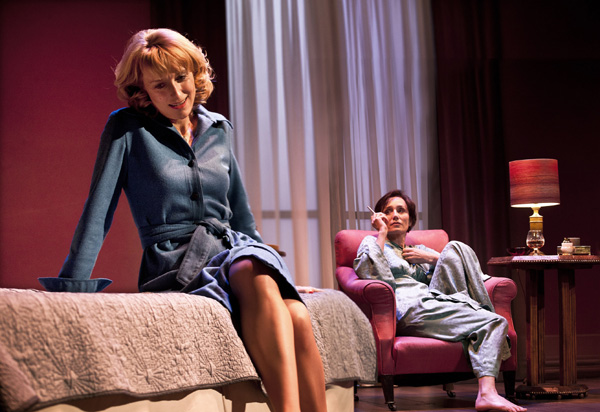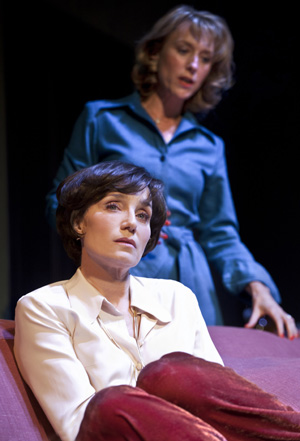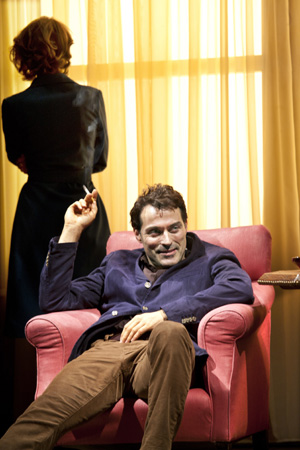Ideally, you should see Ian Rickson’s production of Harold Pinter’s Old Times twice, due to the two female leads in this cryptic story being played alternately by actresses Kristin Scott Thomas and Lia Williams, with Rufus Sewell sandwiched in the middle. This astonishing production toils with Pinter’s themes of identity and memory to confuse the audience, and the result is nothing short of electric.

This is the first Harold Pinter play to be shown since the former Comedy Theatre was renamed after him. Highly enigmatic, it is the play in which Pinter himself starred when it transferred to Broadway in 1985. First performed in 1971, Old Times was dedicated to and directed by the great Sir Peter Hall with interpretations continuing to differ over who the characters, Deeley, Kate and Anna exactly are – if they can all have existed at the same time and whose memories are to be trusted. It is a lesson in the power of the mind and the unreliability of memory, as the three characters battle to make sense of events that have no doubt been mentally corrupted over the years.
Deeley and his wife, Kate, are preparing to welcome Anna to their quiet seaside home. Once Kate’s only friend, they haven’t seen each other for some 20 years. Deeley, played by Rufus Sewell, has previously heard nothing of this old chum of his wife’s and is intrigued. A gleefully prying schoolboy who wants to know everything, Sewell shows us a cheeky, quirky, confident persona with that famous glint in his eye.

Kristin Scott Thomas as Kate is withdrawn and reticent in talking about her former friendship – either she can’t or she won’t remember much about it – brooding with a power that only she can muster: pregnant silences and distant gazes are occasionally interjected with sharp, sometimes cutting remarks. It takes a special gift to be able to move an entire theatre with the merest crook of your neck. She occasionally seems amused by the conversation that wafts on around her, and sometimes irritation creeps into her eyes, but her Kate is unnervingly controlled until her final, terrifying outburst towards the end.
Lia Williams is somewhat brassy as Anna, gasping for breath as she waxes lyrical about the good old days in London when the two women were girls, everything sounding just that bit too good to be true. Deeley and Anna bond over their shared mischievous streak, flirting over the things she and Kate may have got up to in their youth, but such dangerous playfulness always ends in tears, and Anna’s visit quickly unravels as even the nonchalant Deeley gets riled by the snatched glances and whispers between the two women that suggest there might have been more to their relationship than pure friendship.
Deeley and Anna increasingly compete for Kate’s attention until the competition becomes fearsome when Deeley finally bellows that his wife’s passion is his “province.” The tension thus evoked between all sides of this love triangle is both palpable and nerve-wracking. Sewell’s performance is incredibly moving, progressing from jester to wreck as the foundations of his marriage are shaken. During what start out as light-hearted discussions of the past, Deeley is forced to dredge up emotions, to accept that the treasured memories of his wife may not have been as special as he thought.
 “I remember you dead,” Kate yells at Anna, who has been forced onto the floor and writhes in fear. Kate has a memory of Anna in their old flat, lying lifeless with dirt covering her face. Clearly that cannot be so if Anna is in front of her now, but the memories from all three characters start to seem dangerously conflated. You won’t necessarily reach the end of the play with an inkling of what’s really going on, but the joke does seem to be on Deeley or, as Pinter described him, “the man defeated by women.”
“I remember you dead,” Kate yells at Anna, who has been forced onto the floor and writhes in fear. Kate has a memory of Anna in their old flat, lying lifeless with dirt covering her face. Clearly that cannot be so if Anna is in front of her now, but the memories from all three characters start to seem dangerously conflated. You won’t necessarily reach the end of the play with an inkling of what’s really going on, but the joke does seem to be on Deeley or, as Pinter described him, “the man defeated by women.”
There is an interpretation of Old Times that posits Kate and Anna as the same person – two sides of the same tortured personality – which would make sense of the confused and unlikely memories that don’t tally. Although there is no explicit endorsement of this theory at the Harold Pinter Theatre, swapping the female roles between the two leads does rather lend itself to this explanation. I can’t decide if Scott Thomas would be more suited to playing Anna, but it would be interesting to observe the different nuances of conversation and facets of character which could be brought out with the luxury of two artistic visions rather than one. Seeing it twice might be the way to clear much of the muddle but that’s not to say one viewing isn’t 100% worth it. This is an affecting play performed astoundingly well – an acting masterclass – which the bold directing only makes more enticing.
Old Times at the Harold Pinter Theatre, Panton Street, London SW1Y 4DN, until 6th April 2013. For more information and tickets visit the website.



